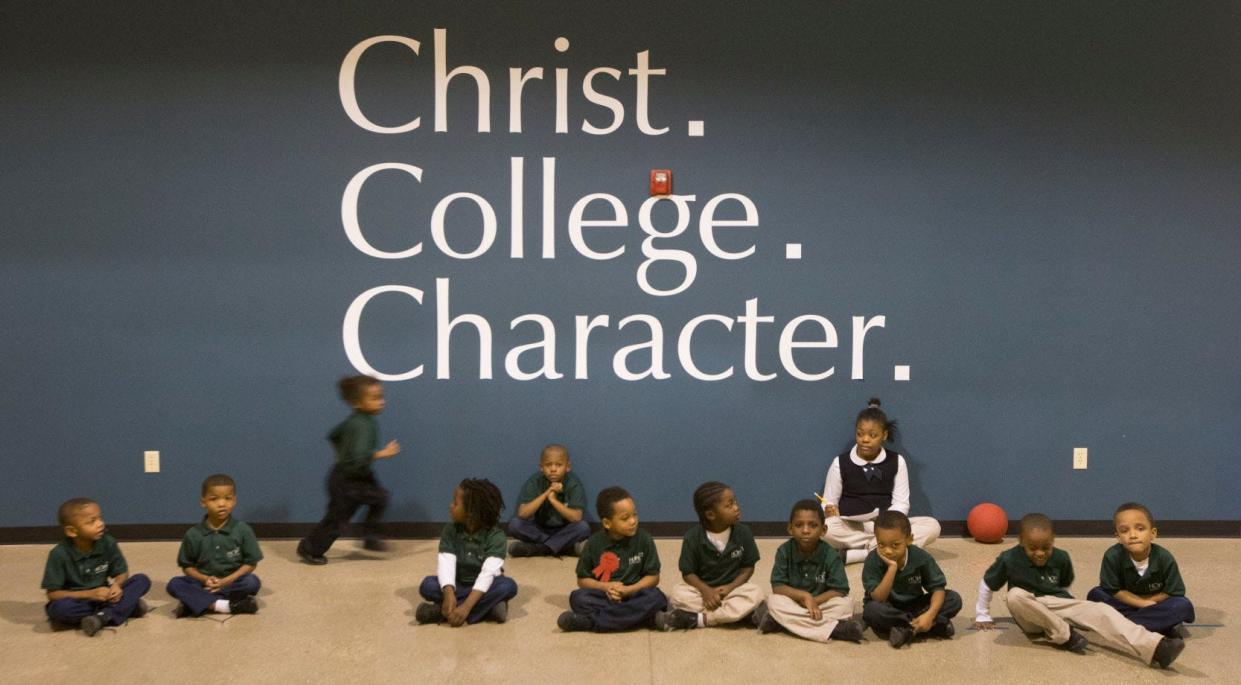Supreme Court rejects petition to directly hear lawsuit seeking to end voucher programs

- Oops!Something went wrong.Please try again later.
- Oops!Something went wrong.Please try again later.
MADISON - The Wisconsin Supreme Court on Wednesday decided not to take up a lawsuit seeking to upend the state's system of education by eliminating funding for independent charter schools and the state's four taxpayer-funded school voucher programs while also lifting state-imposed limits on the amount of funding public schools can receive without a referendum.
The ruling from the liberal-controlled court comes after Democratic Gov. Tony Evers, a former public school educator, and Republican Assembly Speaker Robin Vos said last month such a legal challenge should begin in circuit court instead of being taken straight to the state's highest court.
The lawsuit, brought by Julie Underwood, former University of Wisconsin-Madison School of Education dean, and other Wisconsin residents is funded by the liberal Minocqua Brewing Super PAC.
Former Democratic candidate for the U.S. House and state Assembly Kirk Bangstad, who owns the Minocqua Brewing Co., has created a political action committee using his brewery's namesake to raise money for Democratic causes. The brewery produces beer with politically-themed names.
Bangstad told the Milwaukee Journal Sentinel the petitioners will pursue the lawsuit through circuit court.
"We always thought it was a long shot to get straight to the Supreme Court with this," Bangstad said. "We think that it's super important and this needs to be accomplished in a timely fashion because kids who are not getting the funding they need in public schools aren't going to get that time back."
Bangstad said he sought to take the case directly to the state Supreme Court, in part, because he believed the evidence that would be produced by going through lower courts first is already available at the Department of Public Instruction.
He said he was disappointed in Evers' position on where the lawsuit should begin.
"I think there are political reasons to not want to let this case potentially take the oxygen out of the things that are actually probably more timely or have more of a priority for the state of Wisconsin at the Supreme Court, which is gerrymandering and reproductive rights," Bangstad said.
A spokeswoman for Vos, who is a defendant in the lawsuit, did not immediately respond to a request for comment.
If successful, the lawsuit would overhaul the state's K-12 education landscape by effectively eliminating the school voucher programs, one of which is more than 30 years old and used by nearly 30,000 children in Milwaukee.
Private school voucher programs provide participating schools with a taxpayer-funded voucher to pay for the tuition for each student who is eligible to enroll in the program. The students are typically from lower- and middle-income families.
The state's first voucher program began in Milwaukee in 1990, but the number of vouchers exploded over the last 10 years after Republicans made it a priority to expand the program to the rest of the state.
Last school year, about 29,000 students participated in the Milwaukee voucher program, 17,000 in the statewide program, 4,000 in the Racine program, and 2,000 in the state's voucher program for students with disabilities — costing a total of about $444 million.
Public schools advocates applauded the suit, arguing that vouchers to private schools have drained resources from public schools, while private school advocates slammed the suit and vowed to fight it.
Advocates for private school voucher schools said the effort would hurt thousands of low-income families throughout the state who use the programs to attend private schools.
The lawsuit asks the court to stop three state officials from continuing the choice programs: Vos, Superintendent of Public Instruction Jill Underly and Secretary of the Department of Administration Kathy Blumenfeld.
The suit directly petitioned the state Supreme Court to find that the public funding of the state's choice programs and independent charter schools is unconstitutional. While the court usually hears appeals in cases that have already been tried in lower courts, it does have the authority to take cases brought directly to it.
The justices rejected the petition on Wednesday and did not offer an explanation.
Molly Beck can be reached at molly.beck@jrn.com.
This article originally appeared on Milwaukee Journal Sentinel: Wisconsin Supreme Court declines to hear suit to end voucher programs
